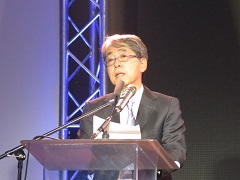Botswana celebrates the end of analog TV broadcasting: the first complete transition to Japanese standards of digital terrestrial broadcasting.
2022.10.12
On October 2, an Analogue Switch-Off (ASO) ceremony was held in the city of Gaborone, Republic of Botswana. The ceremony was held to commemorate the cessation of analog broadcasting in Botswana as a result of the nationwide spread of digital terrestrial broadcasting, made possible through the long-term cooperation of the Japanese government, including JICA.
There are four major types of digital terrestrial broadcasting systems in the world, one of which being the “Japanese system of digital terrestrial broadcasting (ISDB-T).” Japan achieved full transition to digital terrestrial broadcasting in March 2012. A significant feature of the ISDB-T is the Emergency Warning Broadcasting System (EWBS). The Japanese government has been promoting the ISDB-T, and so far, it has been adopted by 20 countries, including Japan. Most recently, the Ministry of Internal Affairs and Communications and JICA have cooperated to disseminate and promote the ISDB-T in Botswana.
While many countries have already deployed digital terrestrial broadcasting, Botswana is the first country to achieve a complete transition to this form of broadcasting among those that have adopted the ISDB-T.
ASO makes it possible to reuse the frequency that was used for analog TV for other purposes, such as mobile phone services. Just as Japan has expanded the use of frequency bandwidth with the spread of 5G services, it is expected that Botswana will utilize the vacant frequencies to facilitate the entry of new services, thereby contributing to the promotion of the country's industry.
JICA dispatched a "Digital Terrestrial Broadcasting Japan System Analog Outage Advisor" to Botswana for a year from March 2017 to compile the National Analog Outage Plan, which was followed by the four-year "Nationwide Digital Terrestrial Broadcasting Establishment (analog switch-off strategy)" project from October 2018. By visiting the country's digital terrestrial broadcasting transmitter stations one by one to check the status of equipment and signals, as well as by conducting activities to raise public awareness of the nationwide analog switch-off, Japanese experts have supported the complete transition to digital terrestrial broadcasting in Botswana.
On the day of the ceremony, the government officials in the Department of Broadcasting Services (DBS) and the Office of the President attended the ceremony, as well as H.E. Hoshiyama Takashi, the Ambassador of Japan to Botswana, who delivered a speech, along with Mr. Eguchi Hideo, Chief Representative of the JICA Botswana Office.



The Ceremony
In his speech, Ambassador Hoshiyama congratulated Botswana for being the first country in Africa to install the ISDB-T and for completing the transition to digital terrestrial broadcasting.
From the Botswana side, Ms. Goitsemang Morekisi, Permanent Secretary of the Ministry for Presidential Affairs, Governance and Public Administration, gave a welcoming speech. This was followed by a keynote speech by Minister Hon. Mr. Kabo N.S. Morwaeng, who noted that the successful completion of the digital migration process in Botswana is a result of a partnership with the government of Japan through JICA.
The ceremony was held in conjunction with Botswana's Independence Day which was September 30. In attendance were Permanent Secretary from the Ministry of Education and Skill Development, the Ministry of Health, and the Ministry of Youth, Gender, Sport and Culture, who will serve as resource providers for content development and data broadcasting going forward.
A traditional dance performance by a Botswana dance team also set the mood for the celebration. The ceremony was broadcast live on Botswana's national television.
scroll